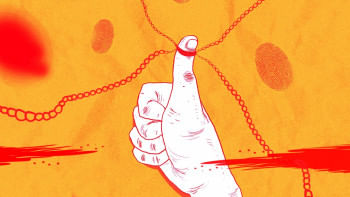Can we have bicycle highways, too?

Are you ready for a surprise? I support the construction of highways.
What? The woman who rants and raves about the harm that cars do in cities, about how car-based infrastructure simply increases car use, resulting in more congestion, pollution, greenhouse gas emissions and road crashes?
Let's get over the prejudice that expressways are for cars. The prejudice is built on the idea that the norm for transport is an individual motorised vehicle (motorcycle or car). Even with the explosion of ride-sharing services as well as car and motorbike purchases, most trips in Dhaka are short and are made on foot or by bicycle or rickshaw. And yet travel without an engine, though better for our health, safety, climate and the environment, is somehow considered "less than" rather than "a heck of a lot better than" travel by motorised vehicle.
Once we overcome that prejudice, we may notice that bicycles are not only for short distances. People can cycle a fair distance. The heat is a factor, admittedly, but heat can be lessened through shade and sprinklers. Hills can be a nuisance, but fortunately most of Bangladesh is flat.
In my own experience, distances that seem exorbitantly far in a car are surprisingly short when travelling by bicycle—if I can avoid the traffic. Sure, they would seem shorter in a car too if there were no traffic, but cars occupy an enormous amount of space, whereas cycles don't. Lots of people can travel by bicycle without creating the congestion made by a few cars. Ditto for parking: bicycles can be parked right next to and literally on top of each other in cheap multi-level structures, whereas each parked car requires far more space as they need room to manoeuvre, and multi-level car parking costs a fortune to build.
Imagine having bicycle highways—ground level or elevated—that would connect, say, Dhanmondi and Gulshan, or Gabtoli-Gulistan-Uttara. Hop on your bicycle and travel safely and conveniently, without burning fuel, wasting space or creating danger for others, and while getting exercise. No traffic congestion, vehicle emissions or honking. And you would probably arrive far faster than if you travelled by bus, car or even motorbike.
Bicycle highways, whether on the ground or elevated, would be far cheaper to build than highways for cars. They would be far smaller and would require almost no maintenance, as it is heavy vehicles, not bicycles, that tear up roads.
Bicycles are good for the economy. The Cycling Embassy of Denmark, in a cost-benefit analysis, has calculated that society gains 4.79 Danish krone per kilometre cycled, mainly due to the sizeable health benefits, while every kilometre driven by car costs society 5.29 krone.
There is a precedent. Belgium, China, Denmark, Germany, the Netherlands, South Korea, Sweden, the UK and the US have all built bicycle highways—and even a few elevated ones. Look it up; the images are captivating.
There are some very sound arguments to be made about the preference for ground-level transport, which more closely connects cyclists with local businesses, thus benefiting the local economy. Then again, it is hard not to drool over the prospect of whizzing along well above the road, not having to stop at intersections or fear being wiped out by a car.
Perhaps there could even be viewing decks, complete with shade and water fountains, so that cyclists could look down and laugh at the cars stuck in traffic below. I am being a bit tongue-in-cheek here, but do take a moment to reflect on how much better life would be if there were a way to bypass the horrific Dhaka traffic and reach our destinations quickly.
True, not everyone can or will ride a bicycle. Cycling infrastructure is still vastly more equitable and accessible than infrastructure for cars as it requires nothing more expensive than a bicycle. Rather than a giant subsidy to the wealthiest, high-quality cycling infrastructure would be a service to the majority. For those who can't yet cycle, it's possible to learn; for those who can't cycle due to a disability, there are rickshaws.
So when we talk about building highways and elevated expressways, let's remember that we can (and should) build them for bicycles instead of for cars.
Debra Efroymson is senior adviser to Canadian NGO HealthBridge and executive director of the Institute of Wellbeing, Bangladesh.
Views expressed in the article are the author's own.
Follow The Daily Star Opinion on Facebook for the latest opinions, commentaries and analyses by experts and professionals. To contribute your article or letter to The Daily Star Opinion, see our guidelines for submission.

 For all latest news, follow The Daily Star's Google News channel.
For all latest news, follow The Daily Star's Google News channel. 





Comments